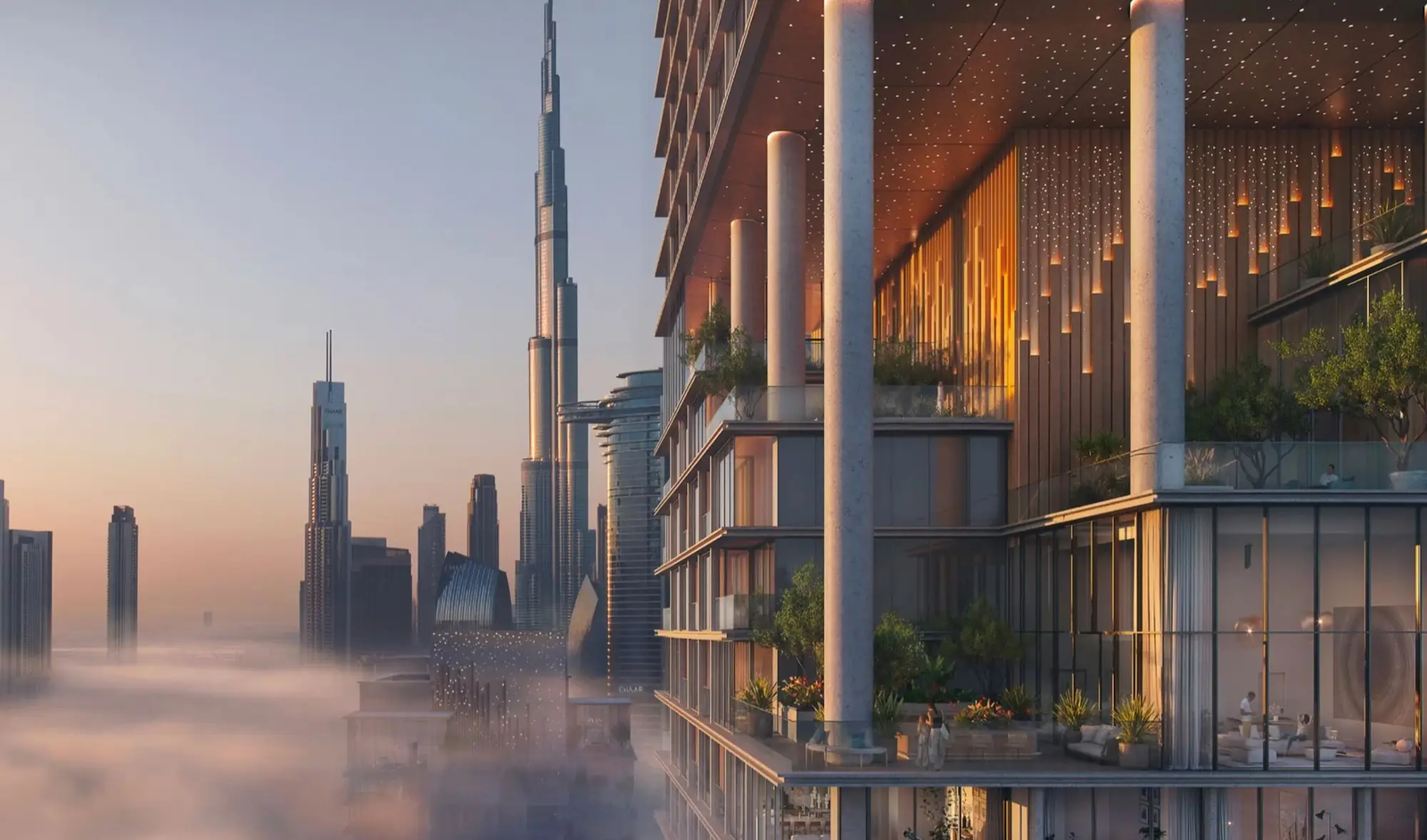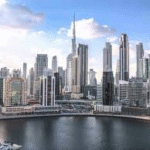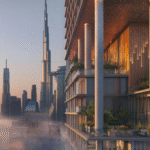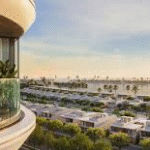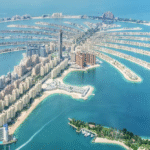Now Reading: 2025 Real Estate Guide: Cheapest Places to Buy in Dubai
-
01
2025 Real Estate Guide: Cheapest Places to Buy in Dubai
2025 Real Estate Guide: Cheapest Places to Buy in Dubai

Table of Contents
Picture yourself owning a home in Dubai, where your budget stretches further than you ever dreamed, and your investment grows in a city pulsing with opportunity. In 2025, Dubai’s real estate market is thriving, with 96,000 transactions worth $87 billion in the first half, 58% driven by buyers from the UK, India, Russia, and China. Affordable areas like Jumeirah Village Circle (JVC), International City, Dubai Sports City, Dubailand, and Dubai South offer 100% freehold ownership, a dirham pegged to the U.S. dollar, and no personal income tax, capital gains tax, or annual property taxes.
Delivering 7-10% rental yields and 6-10% price appreciation, they outshine London (2-4%) and New York (2-3%). Properties over $545,000 qualify for a 10-year Golden Visa, while smaller units offer 2-year residency. Fueled by a 4% population surge and infrastructure growth, projects like Binghatti Heights, Rukan Residences, The Valley, Samana Waves, and Dubai South Residences are perfect for budget-conscious buyers. Navigating fees, VAT, and 2025 regulations is key to securing your affordable Dubai dream.
Why Affordable Areas Are a Smart Buy
Located 20-40 minutes from Dubai International Airport via Sheikh Zayed Road or metro, these areas offer apartments, townhouses, and villas with vacancy rates at a low 2-3% compared to 7-10% globally. You keep 100% of rental income $14,400-$36,000 annually on a $200,000-$500,000 property versus $7,920-$21,600 elsewhere after taxes.
Zero capital gains tax saves $12,000-$50,000 on a $60,000-$250,000 profit, and no annual property taxes save $2,000-$10,000 yearly, unlike London’s council tax (up to 2%) or New York’s property tax (1-2%). Residential purchases dodge 5% VAT ($10,000-$25,000), and Golden Visa perks enhance residency appeal for properties over $545,000. With metro access, community parks, and schools, these areas balance affordability and growth, but fees need careful planning.
Buying here feels like planting a seed for your future.
No Personal Income Tax: Rentals That Build Wealth
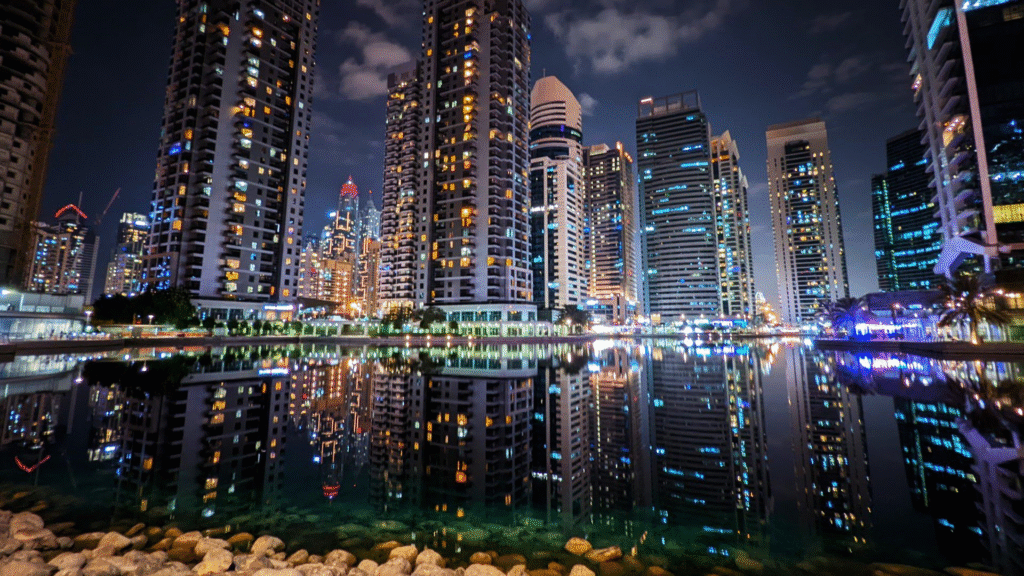
These affordable areas impose no personal income tax, letting you keep every dirham of rental income, unlike the U.S. (up to 37%) or UK (up to 45%). A $200,000 JVC apartment yielding $14,400-$21,600 saves $5,328-$9,720, while a $500,000 Dubai South townhouse yielding $30,000-$45,000 saves $13,500-$20,250. Short-term rentals in JVC and Dubai Sports City, popular with young professionals, require a DTCM license ($408-$816), boosting yields by 10-15% ($1,440-$6,750). Long-term leases in Dubailand need Ejari registration ($54-$136) for stability. Non-compliance risks fines up to $13,612, so proper licensing keeps your profits flowing.
Tax-free rentals feel like a monthly hug for your wallet.
Zero Capital Gains Tax: Profit Without Limits
All five areas offer zero capital gains tax, letting you keep 100% of sale profits. Selling a $200,000 JVC apartment for $250,000 after 25% appreciation yields a $50,000 tax-free profit, saving $10,000-$14,000 compared to London (20-28%) or New York (20-37%). A $500,000 Dubai South townhouse sold for $625,000 yields a $125,000 tax-free gain, saving $25,000-$35,000. Price growth varies: JVC and Dubai South hit 6-9% annually, International City and Dubailand 6-8%, and Dubai Sports City 7-10%. A 4% DLD fee applies on resale ($8,000-$20,000), often split, but tax-free profits boost returns.
Keeping every dirham feels like a financial win.
No Annual Property Taxes: Save on Ownership
Unlike global markets where annual property taxes cost $2,000-$10,000 on a $200,000-$500,000 property, these areas have none, easing ownership costs for budget buyers. Maintenance fees range from $3,000-$7,000 for JVC and International City apartments to $5,000-$10,000 for Dubai Sports City and Dubai South townhouses. A 5% municipality fee on rentals ($720-$2,250) applies, slightly higher in Dubai South due to new amenities. These costs are lower than London’s council tax ($4,000-$10,000) or New York’s property tax, making ownership lighter.
No property taxes feel like a gift to your budget.
VAT Rules: A Budget Buyer’s Edge
Residential purchases skip 5% VAT, saving $10,000-$25,000 on a $200,000-$500,000 property, unlike commercial properties or the UK’s stamp duty (up to 12%, or $24,000-$60,000). Off-plan purchases, common in JVC, Dubailand, and Dubai South, may incur 5% VAT on developer fees ($2,500-$10,000), recoverable via Federal Tax Authority (FTA) registration ($500-$1,000).
Short-term rental operators in JVC must register for VAT if revenue exceeds $102,041, charging 5% but claiming credits on expenses like DTCM fees ($408-$816). A $200,000 JVC apartment yielding $14,400-$21,600 incurs $720-$1,080 in VAT but allows $300-$600 in credits. Non-compliance risks fines up to $13,612, so keeping records is crucial.
VAT exemptions feel like a friendly nudge for your savings.
DLD Fees and Title Deeds: Securing Your Affordable Home
The 4% DLD fee, typically split, is a key cost: $8,000 for a $200,000 JVC apartment or $20,000 for a $500,000 Dubai South townhouse. Gift transfers to family or shareholders reduce DLD to 0.125%, saving $7,750-$19,375. For example, gifting a $500,000 property cuts the DLD fee from $20,000 to $625. Title deed issuance costs $136-$272 and must be registered with the DLD. Broker fees, typically 2% ($4,000-$10,000), may be waived for off-plan projects in JVC or Dubailand. Mortgage registration (0.25% of the loan, or $500-$1,250) and valuation fees ($680-$1,360) apply for financed deals. The 2025 Oqood system ensures escrow compliance for off-plan purchases, protecting your funds.
Title deeds feel like the key to your Dubai dream.
Corporate Tax: A Note for Business Buyers
The 9% corporate tax, introduced in 2023, applies to businesses with profits over $102,110. A company leasing a $200,000 JVC apartment yielding $14,400-$21,600 faces a 9% tax ($1,296-$1,944), reducing net income to $13,104-$19,656. A $500,000 Dubai South townhouse yielding $30,000-$45,000 incurs $2,700-$4,050 in tax. Qualified Free Zone Person (QFZP) status in areas like Dubai Multi Commodities Centre (DMCC) avoids this, saving $3,060-$12,240, with setup costs of $2,000-$5,000. Small business relief waives corporate tax for revenues under $816,000 until December 31, 2026. Individual ownership skips this tax entirely, ideal for budget buyers.
Corporate tax feels like a speed bump you can avoid.
New Tax Rules for 2025
The Domestic Minimum Top-up Tax (DMTT), effective January 1, 2025, imposes a 15% tax on multinationals with revenues over €750 million ($793 million). Individual investors and smaller entities are unaffected, and QFZP status avoids DMTT, saving $3,060-$12,240. Cabinet Decision No. 34 refines Qualifying Investment Fund (QIF) rules, exempting corporate tax if real estate income is below 10%. A QIF earning $1 million, with $100,000 from rentals, faces 9% tax ($8,100) on 90% ($900,000). A July 2025 policy allows corporate tax deductions on fair market value depreciation, saving $2,182-$4,545 annually for a $500,000 property revalued at $625,000.
New rules feel like a puzzle with rewarding solutions.
Top Affordable Projects for 2025
1. Jumeirah Village Circle (JVC): Binghatti Heights
Binghatti Heights ($200,000-$400,000) offers 1-2 bedroom apartments with 7-10% rental yields and 6-9% price growth, driven by affordability and Circle Mall proximity. A $200,000 apartment yields $14,400-$21,600 tax-free, saving $5,328-$9,720. Selling for $250,000 yields a $50,000 tax-free profit, saving $10,000-$14,000. No property taxes save $2,000-$4,000, and VAT exemption saves $10,000. Maintenance fees are $3,000-$7,000, with a 5% municipality fee ($720-$1,080). QFZP saves $3,060-$6,120. U.S. investors deduct depreciation ($3,636-$7,273), saving up to $2,545. Its vibrant community and metro access make it a budget favorite.
JVC feels like an affordable launchpad to wealth.
2. International City: Rukan Residences
Rukan Residences ($150,000-$300,000) offer budget apartments with 7-9% yields and 6-8% price growth, near Dragon Mart and community parks. A $150,000 apartment yields $10,800-$16,200 tax-free, saving $3,996-$7,290. Selling for $187,500 yields a $37,500 tax-free profit, saving $7,500-$10,500. No property taxes save $1,500-$3,000, and VAT exemption saves $7,500. Maintenance fees are $3,000-$5,000, with a 5% municipality fee ($540-$810). QFZP saves $3,060-$6,120. U.S. investors deduct depreciation ($2,727-$5,455), saving up to $1,909. Its low entry price appeals to first-time buyers.
International City feels like a budget-friendly community hub.
3. Dubai Sports City: The Valley
The Valley by Emaar ($300,000-$500,000) offers townhouses with 7-10% yields and 7-10% price growth, near sports facilities and Victory Heights Primary School. A $300,000 townhouse yields $21,000-$30,000 tax-free, saving $9,450-$13,500. Selling for $375,000 yields a $75,000 tax-free profit, saving $15,000-$21,000. No property taxes save $3,000-$5,000, and VAT exemption saves $15,000. Maintenance fees are $5,000-$10,000, with a 5% municipality fee ($1,050-$1,500). QFZP saves $6,120-$12,240. U.S. investors deduct depreciation ($5,455-$9,091), saving up to $3,182. Its active lifestyle draws young families.
Dubai Sports City feels like a dynamic, affordable haven.
4. Dubailand: Samana Waves
Samana Waves ($200,000-$400,000) offers apartments with 7-10% yields and 6-8% price growth, near Global Village and future metro plans. A $200,000 apartment yields $14,400-$21,600 tax-free, saving $5,328-$9,720. Selling for $250,000 yields a $50,000 tax-free profit, saving $10,000-$14,000. No property taxes save $2,000-$4,000, and VAT exemption saves $10,000. Maintenance fees are $3,000-$7,000, with a 5% municipality fee ($720-$1,080). QFZP saves $3,060-$6,120. U.S. investors deduct depreciation ($3,636-$7,273), saving up to $2,545. Its entertainment proximity boosts appeal.
Dubailand feels like a vibrant, budget-friendly gem.
5. Dubai South: Dubai South Residences
Dubai South Residences ($250,000-$500,000) offer apartments with 7-10% yields and 6-9% price growth, driven by Al Maktoum Airport and Expo 2020 infrastructure. A $250,000 apartment yields $17,500-$25,000 tax-free, saving $7,875-$11,250. Selling for $312,500 yields a $62,500 tax-free profit, saving $12,500-$17,500. No property taxes save $2,500-$5,000, and VAT exemption saves $12,500. Maintenance fees are $5,000-$10,000, with a 5% municipality fee ($875-$1,250). QFZP saves $6,120-$12,240. U.S. investors deduct depreciation ($4,545-$9,091), saving up to $3,182. Golden Visa eligibility for properties over $545,000 adds value.
Dubai South feels like a future-proof affordable hub.
Comparing Affordable Areas
Price Range: International City ($150,000-$300,000) and JVC/Dubailand ($200,000-$400,000) are the cheapest; Dubai Sports City and Dubai South ($250,000-$500,000) offer slightly higher entry.
Rental Yields: All deliver 7-10%, with JVC and Dubai Sports City excelling in short-term rentals (10-15% more, or $1,440-$6,750).
Price Appreciation: Dubai Sports City and Dubai South lead at 7-10%, followed by JVC, International City, and Dubailand (6-9%).
Lifestyle: JVC and International City offer vibrant, budget-friendly communities; Dubai Sports City adds sports facilities; Dubailand and Dubai South provide future growth.
Amenities: All feature parks and retail; Dubai South and Dubai Sports City add metro and schools.
ROI Verdict: JVC and Dubai South lead with 8-12% ROI for affordability and growth; International City and Dubailand offer 7-10% for budget buyers; Dubai Sports City balances both.
Choosing feels like finding your perfect budget-friendly home.
Strategies to Maximize Returns
For individuals: First, hold properties personally to avoid corporate taxes, saving $3,060-$12,240. Second, negotiate DLD fee splits, saving $4,000-$10,000. Third, use gift transfers to reduce DLD to 0.125%, saving $7,750-$19,375. Fourth, recover 5% VAT on developer fees via FTA registration ($500-$1,000). Fifth, leverage double taxation treaties with 130+ countries, saving $5,328-$20,250.
Sixth, U.S. investors deduct depreciation ($2,727-$9,091), saving up to $3,182. For corporates: Secure QFZP status, keep QIF income below 10%, and claim depreciation deductions. Hire property managers ($3,000-$10,000 annually) and tax professionals ($1,000-$3,000) to avoid fines up to $136,125. Focus on short-term rentals in JVC and long-term leases in Dubai South.
These strategies feel like a roadmap to your wealth.
Risks to Watch in 2025
A projected oversupply of 182,000 units by 2026 may slow price growth, though demand mitigates this. Choose trusted developers like Emaar, Nakheel, or Binghatti and verify escrow compliance via the 2025 Oqood system. Non-compliance with VAT or DTCM rules risks fines up to $13,612, and corporate tax errors can cost $136,125. Indian investors must disclose properties in India’s Foreign Asset schedule to avoid $135,000 penalties. Currency fluctuations, like a 5% dirham shift, could impact returns.
Why These Areas Are Budget Winners
Dubai’s affordable areas, from International City’s low entry to Dubai South’s growth potential, offer 7-10% yields, 6-10% growth, and tax-free savings of $2,000-$50,000 annually. With Golden Visa perks for higher-end units, metro access, and community amenities, projects like Binghatti Heights, Rukan Residences, The Valley, Samana Waves, and Dubai South Residences are 2025’s top budget picks. Navigate fees, choose your area, and start your Dubai journey on a budget.
read more: Why Dubai’s New Islands Are Shaping the Future of Real Estate



